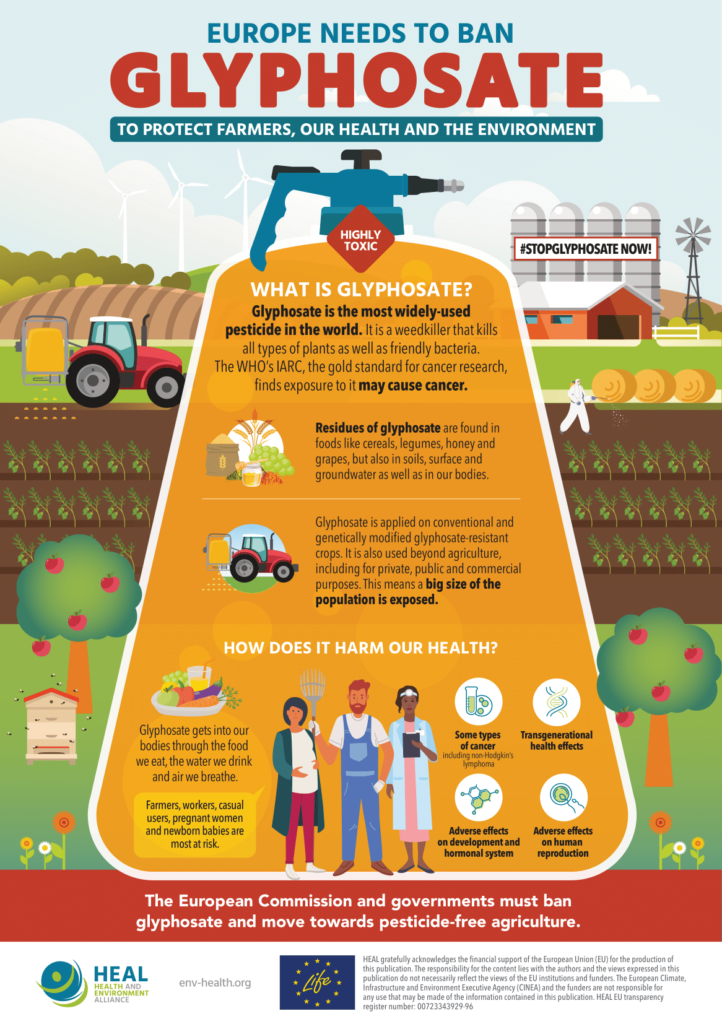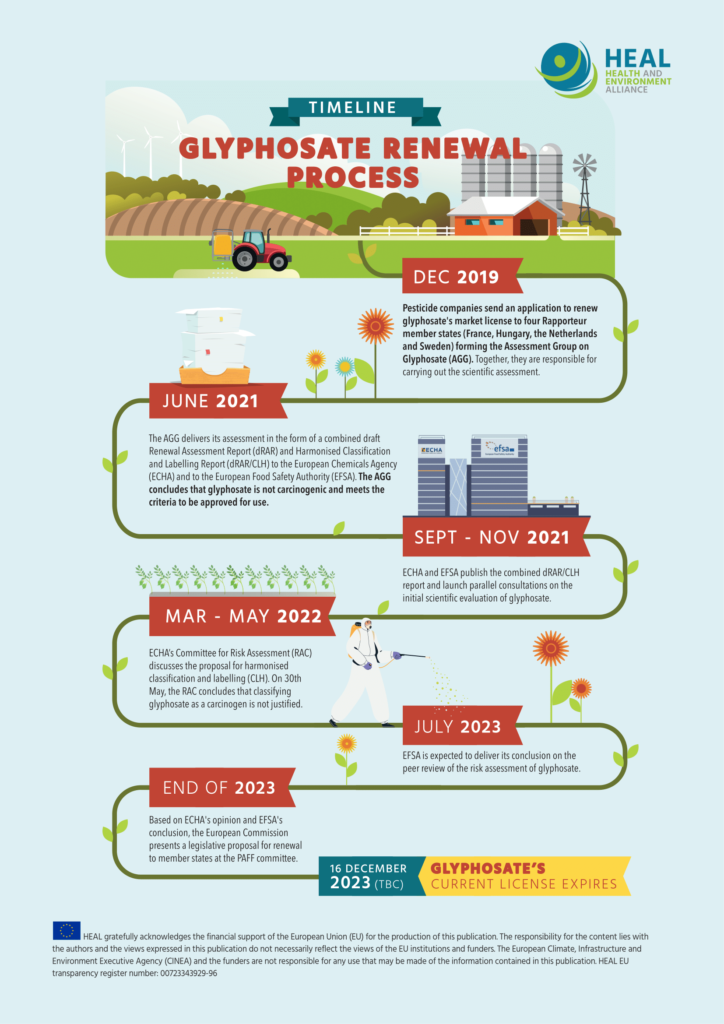Glyphosate is the most widely used pesticide in the world, which is of concern since its negative impacts on human health and the environment are well-documented. Exposure to this infamous pesticide may cause cancer, according to robust scientific evidence.
HEAL’s vision is clear: the use of glyphosate must be banned globally and the protection of human and environmental health must come first.
Exposure to glyphosate-based pesticides has been linked to certain types of cancer as well as to adverse effects on human development and hormonal systems. What is of particular concern is that certain health effects associated with the use of glyphosate can also be passed down to other generations.
In 2015, the World Health Organization’s International Agency for Research on Cancer (IARC), the gold standard in identifying carcinogens, concluded that glyphosate “probably causes cancer in humans”. Despite the scientific excellency and independence of the peer-review process leading to this conclusion, the EU authorities did not concur with IARC on the substance’s carcinogenicity potential and maintained its EU market licence, when glyphosate was discussed for renewal in 2017.
Download as PDF or PNG (also available in French, German, Italian and Spanish)
Meanwhile, independent scientific evidence has piled up on the harms of glyphosate for both human health and the environment. Preliminary findings from a multi-institutional study, which included involvement from the Ramazzini Institute and others, show the potential of glyphosate-based formulations to cause leukaemia at an early life stage already, at doses previously considered safe by regulators. This Global Glyphosate Study is the largest and most comprehensive toxicological study ever undertaken on glyphosate.
The 2023 glyphosate renewal process: a summary
Despite significant health and environment concerns from independent science, the European Commission renewed glyphosate’s market licence for another 10 years in December 2023.
The renewal process of glyphosate’s market licence began in June 2021, when the four EU member states’ rapporteurs for the dossier (France, Hungary, the Netherlands and Sweden) concluded that glyphosate does not pose a risk for human health. HEAL expressed concern at such a conclusion, which sent a worrying signal for the future renewal process.
Health and environment groups raised alarms again in May 2022, this time over the failure of the European Chemical Agency (ECHA) to classify glyphosate as a carcinogen for human health. Glyphosate, according to the agency’s Committee for Risk Assessment (RAC), did not meet the criteria to be labelled as a carcinogenic, genotoxic or reprotoxic agent. A HEAL report published in June 2022 illustrates how this assessment dismissed evidence of glyphosate’s carcinogenicity from animal studies included in the dossier submitted by industry.
After a year-long delay, the European Food Safety Authority (EFSA) finally released its scientific opinion regarding the renewal of the substance in July 2023, concluding that glyphosate does not pose critical risks for human health, despite important data gaps regarding, among other things, the assessment of one of the impurities of glyphosate, the consumer dietary risk assessment, and the assessment of the risks to aquatic plants.
Despite these significant data gaps, the European Commission has renewed the substance’s market licence for another 10 years, with minimal restrictions and hard to enforce mitigation measures. Pesticide Action Network (PAN) Europe and Générations Futures, both HEAL members, have since initiated a legal procedure to challenge this decision in court.
Short recap on the controversy around the 2017 renewal of glyphosate
The last renewal of glyphosate on the EU market dates back to 2017 and was granted for a period of five years. The licence was initially expiring in December 2022, but this deadline was extended by another year until December 2023.
The 2017 renewal process gave rise to significant scientific and political controversies, which include:
- Despite IARC’s 2015 conclusion that glyphosate probably causes cancer in humans, both the European Food Safety Authority (EFSA, 2016) and the European Chemical Agency (ECHA, 2017) concluded that the evidence available did not justify the classification of glyphosate as a carcinogenic substance. These conclusions led to the European Commission to publish an initial proposal to renew the market authorisation of glyphosate for another fifteen years.
- In 2017, a major scandal broke out when it was revealed that major sections of the EU assessment report of glyphosate were copy-pasted directly from industry’s original application. This scandal unfolded in a context of strong criticisms by both scientists and civil society groups about the lack of transparency, scientific objectivity, and the predominance of industry-sponsored studies in the glyphosate renewal process.
- Meanwhile, internal industry documents and emails known as “the Monsanto papers” were revealed in the course of US litigation cases against agri-giant Monsanto. They showed that the company had ghostwritten scientific literature to assert glyphosate’s safety, run campaigns to discredit academic scientists, and hidden concerns connecting glyphosate to cancer.
- In 2017, over one million people signed a European Citizens’ Initiative to call on the EU Commission to fully ban glyphosate and to set clear targets towards a pesticide-free future. Following this initiative, which was co-launched by HEAL and several of our partners, the Commission published a Regulation on the transparency and sustainability of the EU risk assessment in the food chain.
- The severe shortcomings of the European pesticide authorisation process that came to light throughout the renewal of the substance led to the creation of a special investigation committee in the European Parliament (the so-called PEST Committee) in February 2018. The committee put forward 114 recommendations to improve implementation and to minimise the harm that pesticides cause to people and the environment. While the PEST Committee was a welcome step towards better practices, very few of its recommendations have been followed up on.
For a more in-depth recap of key episodes and events from the glyphosate story over the past six years, visit the explainer from Corporate Europe Observatory (CEO), HEAL, GLOBAL 2000 and Pesticide Action Network (PAN) Germany.
Together with our members, HEAL will continue to advocate on the public health benefits of banning glyphosate and other harmful pesticides across Europe. We will continue to stand with affected farmers, workers, their families and residents suffering from health problems as a result of glyphosate exposure.



